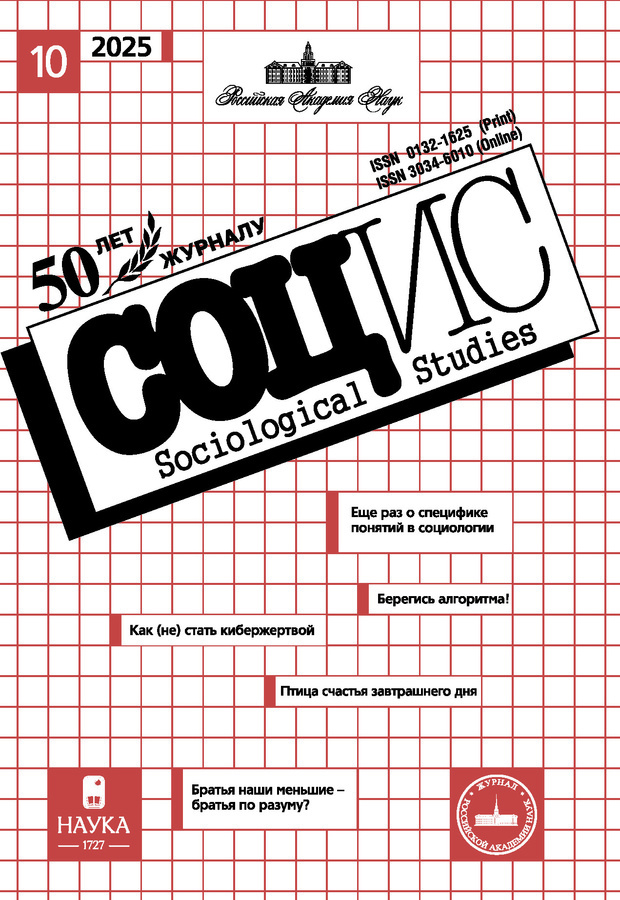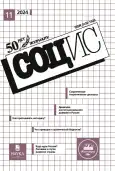Dynamics of Russians’ ideas about the civilizational vector of the country’s development (an empirical analysis)
- Authors: Sushko P.E.1
-
Affiliations:
- Institute of Sociology of FCTAS RAS
- Issue: No 11 (2024)
- Pages: 34-47
- Section: SOCIAL STRUCTURE. SOCIAL POLICY
- URL: https://transsyst.ru/0132-1625/article/view/673675
- DOI: https://doi.org/10.31857/S0132162524110033
- ID: 673675
Cite item
Abstract
Based on the materials of an all-Russian representative survey by the Institute of Sociology of the Federal Research Center of the Russian Academy of Sciences in April 2024, we analyze the polar groups of Russians differing in their ideas about whether Russia is a part of Europe, or it should live by the same rules as Western countries and be oriented towards partnership with them. The study showed that the ratio of the consistent supporters’ of Russia’s independent path of development to those oriented to the pro-Western model of its development approximates 75% to 25%. The dynamics of these groups numbers demonstrate a growing ideological polarization among the mass strata of the population about the perceiving the “collective West” countries. The divergence of views in these polar groups is clearly manifest on all acute topical social issues – in assessments of the dominance of external or internal threats, the consequences of Western sanctions for Russia, the attitude to the Special military operation (SMO), as well as civilizational proximity of the Russian Federation to the-West-vs-the-East. Convictions of the supporters of the specific development vector are more consistent, while the internal structure of the group oriented towards the Western model for Russia’s development remains highly heterogeneous.
Full Text
About the authors
Pavel E. Sushko
Institute of Sociology of FCTAS RAS
Author for correspondence.
Email: sushkope@mail.ru
Cand. Sci. (Soc.), Leading Researcher
Russian Federation, MoscowReferences
- Akhiezer A. S. (1997) Russia: Critique of Historical Experience (Sociocultural Dynamics of Russia). Ed. by I. A. Besedin. Vol. 1. From the Past to the Future. Novosibirsk: Sibirskii Hronograf. (In Russ.)
- Andreev A. L. (2009) Image of Russia and the West in the Russians’ Minds (mid-1990s – 2007). Istoricheskaya psihologiya i sociologiya istorii [Historical Psychology & Sociology of History]. No. 1: 110–138. (In Russ.)
- Andreev A. L., Petukhov V. V. (2015) Russia and the world around. How does the attitude of Russians change towards the Europe – Asia paradigm. Svobodnaia mysl [Free Though]. No. 3: 107–118. (In Russ.)
- Atlas of modernization of Russia and its regions: socioeconomic and sociocultural trends and problems. (2016) Comp. аnd ed. by N. I. Lapin. Moscow: Ves’ Mir. (In Russ.)
- Dudin I. V. (2024) The nation’s Attitude towards the Main Social Contradictions in Russian Society: Current State, Dynamics, Factors. Sotsiologicheskiy zhurnal [Sociological Journal]. Vol. 30. No. 1: 90–112. (In Russ.)
- Inglehart R., Welzel C. (2011) Modernization, Cultural Change, and Democracy. The Human Development Sequence. Moscow: Novoe Izdatel’stvo. (In Russ.)
- Is Russian society ready for modernization? (2010) Ed. by M. K. Gorshkov, R. Krumm, N. E. Tikhonova. Moscow: Ves’ Mir. (In Russ.)
- Latova N. V. (2017) The Industrial Culture of Modern Russian Workers as an Element of Their Human Capital: an Ethnometric Analysis Using Hofstede’s Model. Mir Rossii. Sociologiya. Etnologiya [Universe of Russia. Sociology. Ethnology]. Vol. 26. No. 3: 36–63. (In Russ.)
- Lenzner T., Höhne J. K. (2021) Measuring Subjective Social Stratification: How Does the Graphical Layout of Rating Scales Affect Response Distributions, Response Effort, and Criterion Validity in Web Surveys? International Journal of Social Research Methodology. Nо. 25(2): 269–275.
- Magun V. S. (2023) The Evolution of Basic Human Values of the Russians, 2006–2021. Sotsiologicheskie issledovaniya [Sociological Studies]. Nо. 12: 44–58. (In Russ.)
- Magun V. S., Rudnev M. G. (2008) Life Values of the Russian Population: Similarities and Differences in Comparison to other European Countries. Vestnik obshchestvennogo mneniya. Dannye. Analiz. Diskussii. [The Russian Public Opinion Herald. Data. Analysis. Discussions]. Nо. 1(93): 33–58. (In Russ.)
- Petuhov V. V., Sedova N. N. (2015) The Internal Threats vs the External Threats to Russia: the Dynamics of Public Opinion. Vlast` [The Authority]. No 6: 23–29. (In Russ.)
- Petukhov V. V., Petukhov R. V. (2019) Request for Change: Reasons for Updating, Key Terms and Potential Carriers. POLIS. Politicheskye issledovanya [POLIS. Political Studies]. No. 5: 119–133. (In Russ.)
- Russian Society and the Challenges of Time. The seven book. (2024) Eds. by M. K. Gorshkov, N. E. Tikhonova. Moscow: Ves’ Mir. (In Russ.)
- Sushko P. E. (2022) Russians’ Ideas about Possible Ways for Russia’s Development: Prevalence and Specificity. Sotsiologicheskie issledovaniya [Sociological Studies]. Nо. 11: 25–37. (In Russ.)
- Tikhonova N. E. (2011) Special Features of Normative Value System of Russian Society Within the Modernization Theory. Terra Economicus. Vol. 9. No. 2: 60–85. (In Russ.)
- Tikhonova N. E. (2012) Peculiarities of “Russian Modernists” and Prospects of Cultural Dynamics of Russia. Obschestvennye nauki i sovremennost’ [Social Sciences and Modernity]. No. 2: 38–52. (In Russ.)
- Tikhonova N. E. (2021) Russians’ Perceptions of the Relationship between the Individual and State Interests: an Empirical Analysis of Dynamics. POLIS. Politicheskye issledovanya [POLIS. Political Studies]. No. 6: 155–170. (In Russ.)
- Tikhonova N. E. (2024) Ideological segmentation of mass strata of the population under conditions of aggravated confrontation with the West (empirical analysis). POLIS. Politicheskye issledovanya [POLIS. Political Studies]. No. 5: 136–153. (In Russ.)
- Tikhоnova N. Е. (2023) The Worldview of Supporters of the Western Path of Development for Russia among the General Population. Mir Rossii. Sociologiya. Etnologiya [Universe of Russia. Sociology. Etnology]. Vol. 32. No. 4: 6–35. (In Russ.)
Supplementary files















